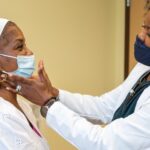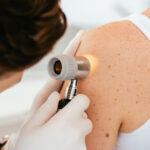By Annette Pinder
New recommendations drafted by the U.S. Preventive Services Task Force (task force) say that all women assigned female at birth, who are at an average risk of breast cancer, should begin screening at age 40. In the past, the task force recommended that women commence screenings at age 50, and that women ages 40 to 49 consider it, based upon their personal risk. However, Dr. Carol Mangione, an internal medicine specialist at UCLA, previous Chair of the U.S. Preventive Services Task Force, and co-author of the newly drafted recommendations, says that a thorough review of evidence by an independent group of experts now recommends that women begin screenings at age 40.
According to NPR, many doctors follow the task force guidelines, and the Affordable Care Act requires most private health insurers to cover annual mammograms, with no cost sharing, making them free to patients. Additionally, the CDC notes that breast cancer is the leading cause of cancer death among women, and about 42,000 women and 500 men die from the disease each year.
Regarding the new guidelines, Mangione said, “If all women followed our new recommendation, we could reduce mortality from breast cancer in the U.S. by about 20%, saving about 8,000 lives a year.” She also noted that Black women are 40% more likely to die from breast cancer, making this new recommendation important in addressing this disparity. “Starting at 40 actually creates the most benefit for Black women in our country,” says Mangione. The task force is also urging that more research be undertaken to address this disparity. Additionally, women with a family history or genetic risk factors that place them at high risk for developing breast cancer can start screenings before age 40.
In reviewing whether annual screening would save more lives than screening every other year, the task force found that every other year was an optimal strategy. However, Mangione said additional research regarding this is still needed. She said, “Believe it or not, there’s never been a clinical trial in the U.S. that has compared annual to biannual with our current technology and treatments.” The task force is also asking for more research to better understand whether people with dense breasts, which can make breast cancer more difficult to detect, can benefit from additional screening such as breast ultrasound or MRI.
Different medical groups have had varied recommendations regarding breast cancer screening. For instance, the American Cancer Society recommended that screenings commence at age 45, and the American College of Obstetricians and Gynecologists recommends women at average risk undergo screening every one to two years, beginning at age 40. The new task force recommendation now aligns the different recommendations, with a consensus that mammograms are recommended every other year beginning at age 40.
Need a mammogram? Windsong Radiology sees patients throughout Western New York in Amherst, Hamburg, Lancaster, West Seneca, and Williamsville. All of Windsong’s imaging suites hold the ACR Breast Imaging Center of Excellence accreditation. To make an appointment, call 716-631-3500, or visit www.windsongwny.com.












